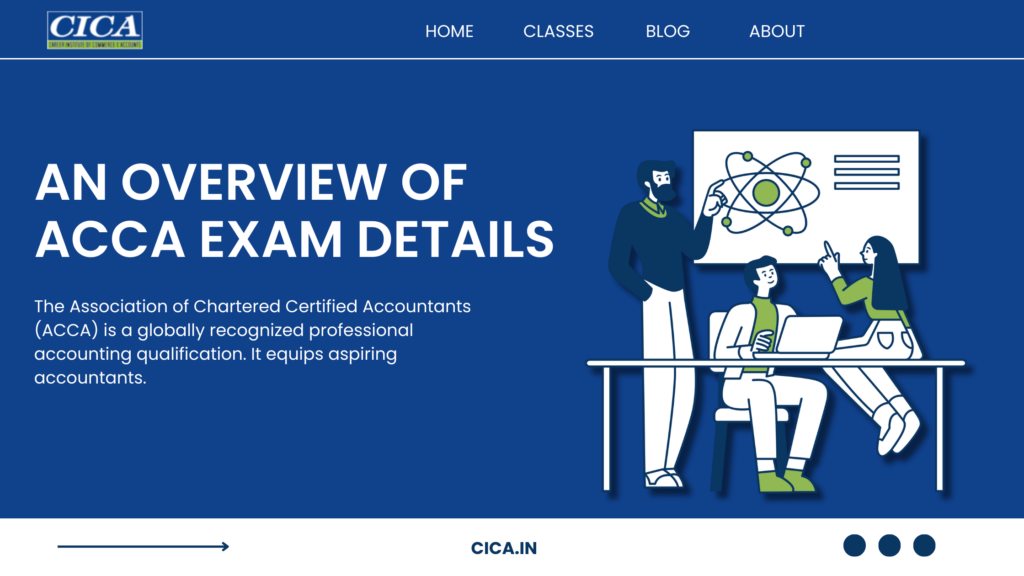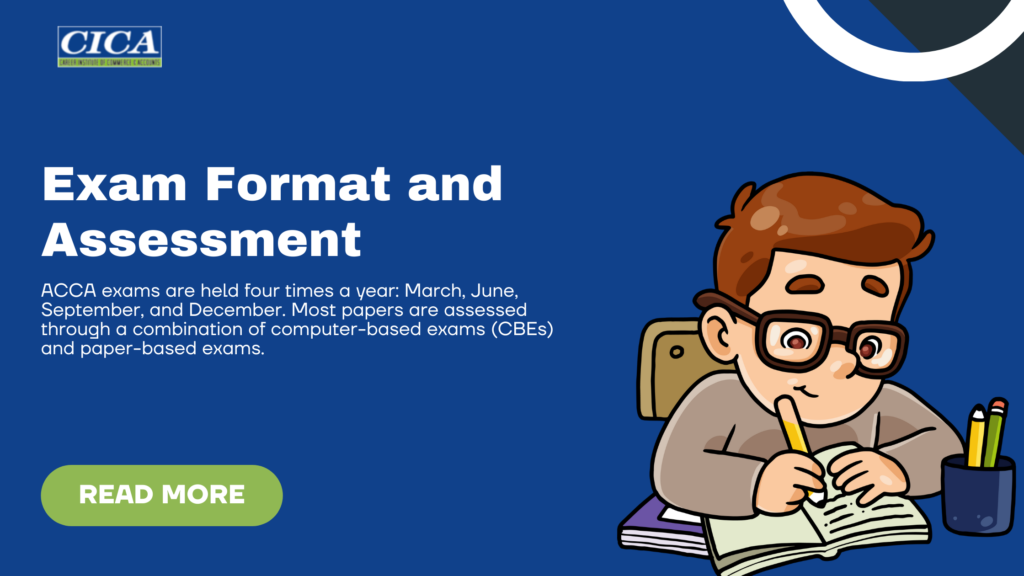
The Association of Chartered Certified Accountants (ACCA) is a globally recognized professional accounting qualification. It equips aspiring accountants and finance professionals with the skills and knowledge necessary to excel in their careers. If you’re considering a career in accounting, the ACCA qualification is a strong choice due to its international recognition and comprehensive curriculum. Hence, This blog will provide an in-depth overview of the ACCA Exam Details , including its structure, subjects, study approach, and tips for success.
Understanding ACCA: What Is It?
ACCA is a global professional body offering the Chartered Certified Accountant qualification. Established in 1904, ACCA has over 200,000 members and 500,000 students in 179 countries. Therefore, It is recognized by various international accounting bodies, making it a valuable qualification for those seeking a career in accounting and finance.
Additionally, ACCA qualification is designed to ensure that graduates possess the technical and professional skills required to work in a wide range of industries and sectors. Therefore, It combines technical knowledge, ethics, and professional skills to create well-rounded professionals.
ACCA Qualification Structure
The ACCA qualification comprises three levels: Applied Knowledge, Applied Skills, and Strategic Professional. Each level builds on the previous one, developing a candidate’s knowledge, skills, and strategic insight.
1. Applied Knowledge
- Business and Technology (BT)
- Management Accounting (MA)
- Financial Accounting (FA)
2. Applied Skills
- Corporate and Business Law (LW)
- Performance Management (PM)
- Taxation (TX)
- Financial Reporting (FR)
- Audit and Assurance (AA)
- Financial Management (FM)
3. Strategic Professional
- Essentials
- Strategic Business Leader (SBL)
- Strategic Business Reporting (SBR)
- Options (two to be chosen)
- Advanced Financial Management (AFM)
- Advanced Performance Management (APM)
- Advanced Taxation (ATX)
- Advanced Audit and Assurance (AAA)
Detailed Breakdown of Each Level
1. Applied Knowledge
The Applied Knowledge level introduces basic business and financial principles. It lays the foundation for more complex topics in the subsequent levels.
- Business and Technology (BT): This paper covers the business environment, the role of accounting in business, and introduces management and financial accounting. It is crucial for understanding the broader context in which accounting operates.
- Management Accounting (MA): This paper focuses on the principles of management accounting, including costing techniques, budgeting, and performance management. It’s essential for developing decision-making skills in a business context.
- Financial Accounting (FA): This paper deals with the fundamentals of financial accounting, including double-entry bookkeeping, preparing financial statements, and understanding financial reporting standards.
2. Applied Skills
Therefore, Applied Skills level builds on the knowledge acquired at the Applied Knowledge level and introduces more technical subjects.
- Corporate and Business Law (LW): This paper covers essential principles of law, particularly as they relate to business. Topics include contract law, company law, and employment law, among others.
- Performance Management (PM): This paper develops management accounting skills further, focusing on cost management, performance measurement, and decision-making.
- Taxation (TX): This paper provides a comprehensive understanding of taxation principles and practices, covering personal and business tax.
- Financial Reporting (FR): This paper advances the principles of financial accounting, focusing on the preparation of financial statements in accordance with international standards.
- Audit and Assurance (AA): This paper introduces the principles of auditing, focusing on the regulatory environment, audit processes, and standards.
- Financial Management (FM): This paper covers financial management principles, including investment, financing, and dividend decisions.
3. Strategic Professional
The Strategic Professional level is the final stage and focuses on developing strategic and leadership skills.
- Strategic Business Leader (SBL): This is an integrated case study paper that assesses students’ ability to apply their technical, ethical, and professional skills in real-world scenarios. It covers a wide range of topics including leadership, governance, risk management, and strategy.
- Strategic Business Reporting (SBR): This paper focuses on advanced financial reporting, requiring students to analyze and interpret financial statements and apply IFRS in various scenarios.
- Options Papers: Students must choose two from the following:
- Advanced Financial Management (AFM): This paper deals with advanced investment appraisal, corporate finance, risk management, and treasury management.
- Advanced Performance Management (APM): This paper covers advanced performance management techniques, focusing on strategic planning and control.
- Advanced Taxation (ATX): This paper delves into complex tax issues, including corporate and international tax.
- Advanced Audit and Assurance (AAA): This paper focuses on complex auditing issues, including professional and ethical considerations.

Exam Format and Assessment
Therefore, ACCA exams are held four times a year: March, June, September, and December. Most papers are assessed through a combination of computer-based exams (CBEs) and paper-based exams.
- Applied Knowledge exams: These are computer-based and can be taken at any time. They consist of objective test questions, multiple-choice questions, and other question types designed to test basic knowledge.
- Applied Skills and Strategic Professional exams: These are usually paper-based and held during the quarterly exam sessions. They include a mix of multiple-choice questions, structured questions, and scenario-based questions. The Strategic Business Leader (SBL) paper is unique as it is a four-hour case study exam designed to test a range of skills in a simulated business environment.
Ethics and Professional Skills Module
In addition to the exams, ACCA requires students to complete the Ethics and Professional Skills Module (EPSM). Further, This module is designed to develop the ethical and professional skills necessary for a successful career in accounting. It covers topics such as ethical behavior, corporate governance, and professional skills like communication and leadership.
Practical Experience Requirement (PER)
To become a fully qualified ACCA member, candidates must complete three years of relevant practical experience. This experience can be gained before, during, or after the exams. The PER is designed to ensure that candidates can apply their theoretical knowledge in real-world situations, developing the practical skills required for a successful career in accounting and finance.
Study Approach and Tips for Success
Successfully completing the ACCA exams requires a strategic approach to study. Here are some tips to help you succeed:
- Understand the Syllabus: Start by thoroughly understanding the syllabus for each paper. ACCA provides detailed syllabuses that outline the topics covered, learning objectives, and exam format.
- Create a Study Plan: Develop a realistic study plan that allocates sufficient time for each subject. Ensure you balance your study time with other commitments and include time for revision.
- Use ACCA Resources: ACCA offers a range of study resources, including study guides, past exam papers, and examiner reports. additionally These resources are invaluable for understanding what is expected in the exams and for practicing exam techniques.
- Join a Study Group: Joining a study group can provide motivation and support. Hence, It’s an opportunity to discuss difficult topics, share resources, and learn from others.
- Practice Past Papers: Practicing past exam papers is crucial for understanding the exam format and timing. It also helps identify areas where you need further study.
- Attend Tuition Classes: If possible, attend tuition classes provided by ACCA-approved learning providers. These classes offer structured learning and access to experienced tutors who can provide guidance and support.
- Focus on Exam Technique: Good exam technique can make a significant difference. Make sure you understand how to structure your answers, manage your time during the exam, and approach different types of questions.
- Stay Updated: Ensure you stay updated with any changes to the syllabus or exam format. ACCA regularly updates its syllabus to reflect changes in the accounting profession.
- Take Care of Your Well-being: Studying for professional exams can be stressful. It’s important to take care of your physical and mental well-being. Make sure you get plenty of sleep, maintain a healthy diet, and take breaks as necessary.
Conclusion
The ACCA qualification is a robust and comprehensive path to becoming a qualified accountant. It provides a blend of theoretical knowledge and practical skills that are essential for a successful career in accounting and finance. Therefore, By understanding the exam structure, utilizing available resources, and adopting effective study techniques, you can successfully navigate the ACCA Exam Details and achieve your professional goals.
Enrolling in ACCA classes with a reputable coaching provider can further enhance your chances of success. Professional guidance, structured learning, and access to experienced tutors can make a significant difference in your preparation and performance.
If you’re committed to advancing your career in accounting and finance, the ACCA qualification is a valuable investment. Hence, It opens doors to a wide range of opportunities and equips you with the skills and knowledge needed to thrive in the global business environment. Start your ACCA journey today and take the first step towards a rewarding and successful career.
Hence, Join CICA today and take the first step towards achieving your ACCA qualification with confidence. With our expert guidance and comprehensive support, you’ll be well-prepared to succeed in your exams and build a successful career in accounting and finance.
